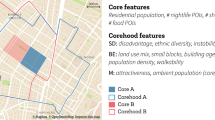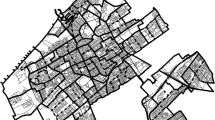Abstract
Nowadays, the ever increasing digitization of our societies is producing an unprecedented amount of data about human behavior. At the same time, advances in machine learning and complex systems enable us to build explanatory and/or predictive computational models of human behavior. Interestingly, these data and models can also be used to better understand the factors associated with specific neighborhoods’ outcomes such as vitality, safety perception, crime levels, innovation, segregation, traffic congestion, etc., and to design more efficient policymakers’ interventions. In particular, leveraging census data, mobile phone traces, information from OpenStreetMap, and street view images, we describe a set of studies where we (i) infer how vital and livable a city is; (ii) find urban appearance conditions that magnify and influence urban life; (iii) study the relationship of urban conditions with societal outcomes such as urban crime levels; and (iv) model the impact of pandemic shocks such as COVID-19 and related non-pharmaceutical interventions on human behavior.
Access this chapter
Tax calculation will be finalised at checkout
Purchases are for personal use only
Similar content being viewed by others
Notes
References
Glaeser, E.L.: Triumph of the City: How Our Greatest Invention Makes Us Richer, Smarter, Greener, Healthier, and Happier. Penguin Press, New York (2011)
Milgram, S.: The experience of living in cities. Science 167, 1461–1468 (1970)
Bettencourt, L.M.A., Lobo, J., Helbing, D., Kühnert, C., West, G.B.: Growth, innovation, scaling, and the pace of life in cities. Proc. Natl. Acad. Sci. 104(17), 7301–7306 (2007)
Bettencourt, L.M.A., West, G.B.: A unified theory of urban living. Nature 467(7318), 912–913 (2010)
Bettencourt, L.M.A.: The origin of scaling in cities. Science 340(6139), 1438–1441 (2013)
Schläpfer, M., Bettencourt, L.M.A., Grauwin, S., Raschke, M., Claxton, R., Smoreda, Z., West, G.B., Ratti, C.: The scaling of human interactions with city size. J. R. Soc. Interf. 11, 20130789 (2014)
Boyd, R., Richerson, P.J., Henrich, J.: The cultural niche: why social learning is essential for human adaptation. Proc. Natl. Acad. Sci. 108 (supplement_2), 10918–10925 (2011)
Pan, W., Ghoshal, G., Krumme, C., Cebrian, M., Pentland, A.: Urban characteristics attributable to density-driven tie formation. Nat. Commun. 4, 1961 (2013)
Glaeser, E.L., Kolko, J., Saiz, A.: Consumer city. J. Econ. Geogr. 1, 27–50 (2001)
Florida, R.: The Rise of the Creative Class - Revisited: Revised and Expanded. Basic Books (2014)
Logan, J.R., Stults, B.J., Farley, R.: Segregation of minorities in the metropolis: two decades of change. Demography 41(1), 1–22 (2004)
Goldsmith, W., Blakely, E.: Separate Societies: Poverty and Inequality in US Cities. Temple University Press, Philadelphia (2010)
Cassiers, T., Kesteloot, C.: Socio-spatial inequalities and social cohesion in European cities. Urban Stud. 49(9), 1909–1924 (2012)
Iceland, J., Weinberg, D., Hughes, L.: The residential segregation of detailed Hispanic and Asian groups in the United States: 1980–2010. Demograph. Res. 31, 593–624 (2014)
Florida, R.: The New Urban Crisis: How Our Cities Are Increasing Inequality, Deepening Segregation, and Failing the Middle Class, and What We Can Do About it. Basic Books (2017)
Muster, S., Marcińczak, S., Van Ham, M., Tammaru, T.: Socioeconomic segregation in European capital cities: increasing separation between poor and rich. Urban Geogr. 38(7), 1062–1083 (2017)
Sampson, R.J.: Great American City: Chicago and the Enduring Neighborhood Effect, University of Chicago Press, Chicago (2012)
Lee, Y., Eck, J.E., SooHyun, O., Martinez, N.N.: How concentrated is crime at places? A systematic review from 1970 to 2015. Crime Sci. 6(6), (2017)
Barthelemy, M.: The Structure and Dynamics of Cities: Urban Data Analysis and Theoretical Modeling. Cambridge University Press, Cambridge (2016)
Zheng, Y.: Urban Computing. MIT Press, London (2019)
Zheng, Y., Capra, L., Wolfson, O., Hai, Y.: Urban computing: concepts, methodologies, and applications. ACM Trans. Intell. Syst. Technol. 5(3), 1–55- (2014)
Jacobs, J.: The Death and Life of American Cities. Random House, New York (1961)
De Nadai, M., Staiano, J., Larcher, R., Sebe, N., Quercia, D., Lepri, B.: The death and life of great Italian cities: a mobile phone data perspective. In: Proceedings of The 25th International Conference On World Wide Web, pp. 413–423 (2016)
Newman, O.: Defensible Space. Macmillan, New York (1972)
De Nadai, M., et al.: Are safer looking neighborhoods more lively? A multimodal investigation into urban life. In: Proceedings of the 24th ACM International Conference on Multimedia, pp. 1127–1135 (2016)
Krizhevsky, A., Sutskever, I., Hinton, G.E. ImageNet classification with deep convolutional neural networks. In: Advances in Neural Information Processing Systems (NIPS), p. 25 (2012)
De Nadai, M., Xu, Y., Letouzé, E., González, M., Lepri, B.: Socio-economic, built environment, and mobility conditions associated with crime: a study of multiple cities. Sci. Rep. 10, 1–12 (2020)
Sampson, R.J., Byron Groves, W.: Community structure and crime: testing social-disorganization theory. Am. J. Sociol. 94(4), 774–802 (1989)
Sampson, R.J., Raudenbush, S.W., Earl, F.: Neighborhoods and violent crime: a multilevel study of collective efficacy. Science 277(5328), 918–924 (1997)
Lucchini, I., et al.: Living in a pandemic: changes in mobility routines, social activity and adherence to COVID-19 protective measures. Sci. Rep. 11, 1–12 (2021)
Nevill-Manning, C., Witten, I.: Identifying hierarchical structure in sequences: a linear-time algorithm. J. Artif. Intell. Res. 7, 67–82 (1997)
Hastie, T., Tibshirani, R., Friedman, J.: The Elements of Statistical Learning, 2nd edn. Springer, New York (2009). https://doi.org/10.1007/978-0-387-84858-7
Goodfellow, I., et al.: Generative adversarial nets. In: Advances in Neural Information Processing Systems (NIPS), pp. 2672–2680 (2014)
Isola, P., Zhu, J.-Y., Zhou, T., Efros, A.A.: Image-to-image translation with conditional adversarial networks. In: Proceedings of the IEEE Conference on Computer Vision and Pattern Recognition (CPVR), pp. 5967–5976 (2017)
Ledig, C., et al.: Photo-realistic single image super-resolution using a Generative Adversarial Network. In: Proceedings of the IEEE Conference on Computer Vision and Pattern Recognition (CPVR), pp. 4681–4690 (2017)
Zhu, J.-Y., Park, T., Isola, P., Efros, A.A.: Unpaired image-to-image translation using cycle-consistent adversarial networks. In: Proceedings of the IEEE International Conference on Computer Vision (ICCV) (2017)
Author information
Authors and Affiliations
Corresponding author
Editor information
Editors and Affiliations
Rights and permissions
Copyright information
© 2022 Springer Nature Switzerland AG
About this paper
Cite this paper
Lepri, B., Centellegher, S., Nadai, M.D. (2022). Understanding and Rewiring Cities. In: Chiusano, S., Cerquitelli, T., Wrembel, R. (eds) Advances in Databases and Information Systems. ADBIS 2022. Lecture Notes in Computer Science, vol 13389. Springer, Cham. https://doi.org/10.1007/978-3-031-15740-0_1
Download citation
DOI: https://doi.org/10.1007/978-3-031-15740-0_1
Published:
Publisher Name: Springer, Cham
Print ISBN: 978-3-031-15739-4
Online ISBN: 978-3-031-15740-0
eBook Packages: Computer ScienceComputer Science (R0)




